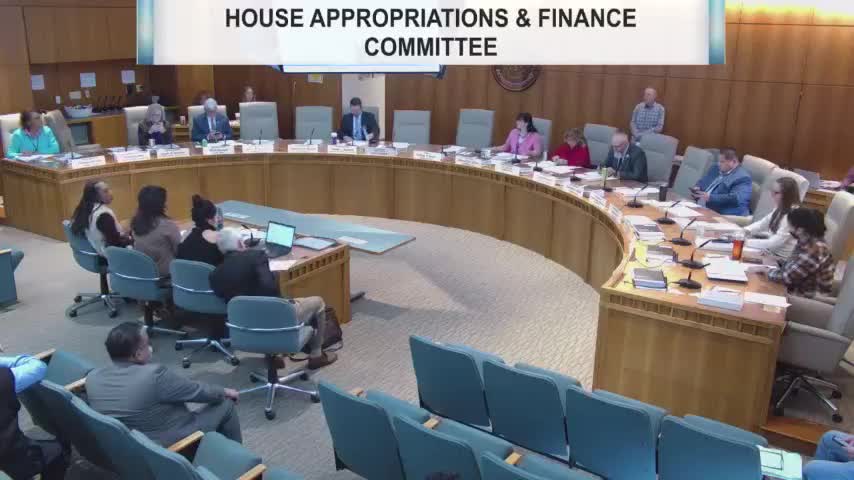Committee adopts substitute to extend civil filing window for childhood sexual-assault survivors
Get AI-powered insights, summaries, and transcripts
Subscribe
Summary
The House Appropriations & Finance Committee on a 15-1 vote approved a committee substitute to House Bill 73 that would allow sexual-assault survivors abused as children to file civil claims until their 58th birthday and would open a three-year look-back window after the bill’s effective date.
The House Appropriations & Finance Committee on a 15-1 vote on the committee substitute advanced legislation that would expand the civil statute of limitations for childhood sexual assault, allowing survivors to file civil claims until their 58th birthday and opening a three-year look-back window after the bill’s effective date.
The substitute was adopted after sponsor Representative Cynthia Anaya (sponsor) described the measure as narrowly targeted to civil claims for childhood sexual assault and not intended to change the state’s treatment of governmental entities under the New Mexico Tort Claims Act or the New Mexico Civil Rights Act.
The substitute — identified in committee as committee substitute 231485.2 — would let a survivor bring a civil claim under the covered statute until age 58. It also creates a three-year period after the bill takes effect during which survivors of any prior year could bring claims under that statute; after the three-year look-back window closes, claims would no longer be allowed under this provision.
Lex Garcia, identified to the committee as a survivor and an expert on the bill, testified about personal experience and the effects of delayed reporting. "I reported when I was 32 years old, which is far past our current statute of limitations, but far before the average age of disclosure, which is 52 years old," Garcia said. Garcia urged lawmakers to view the bill as an investment in accountability and prevention.
Supporters told the committee the substitute is a compromise. Representative Anaya said the 58-year limit was derived from the average age of disclosure (about 52) plus additional years to reach the proposed cap. She told the committee the three-year look-back period was intended as a middle ground compared with other states’ approaches.
Law enforcement and advocacy witnesses endorsed the substitute. Larry Sontag, a member of the Better Together New Mexico Advocacy Network and a retired Albuquerque police supervisor, said civil remedies sometimes are the only available route to accountability when criminal prosecution is not possible. "Expanding the opportunities for victims of childhood sexual abuse that this law would put into effect, I support," he told the panel.
Marty Esquivel, general counsel for the New Mexico Public School Insurance Authority, told members the authority worked with the sponsor and supports the substitute, saying prior ambiguities had been addressed and that the revised fiscal impact report (FIR) on the substitute shows no fiscal impact to agencies under the revised language.
Committee members pressed presenters on who could be sued and how liability would work. The sponsor and experts repeatedly said the substitute does not change existing law under the New Mexico Tort Claims Act: when a public employee acts within the scope of employment, claims against the employer remain governed by the Tort Claims Act and the New Mexico Civil Rights Act. The substitute applies to private individuals and private entities (for example, churches or private schools), not to governmental entities as currently defined.
Members also raised questions about insurance implications and estate liability when a perpetrator is deceased. Experts told the committee that many insurance policies exclude criminal acts and that other states that have eliminated or extended civil limitations for childhood sexual abuse have not experienced mass insurer withdrawals, though panelists acknowledged further research on insurance effects was warranted. On estate liability, witnesses said the civil claim remains against the wrongdoer and, if the wrongdoer is deceased or judgment-proof, recovery may be limited by available assets and applicable family or community property rules.
Committee debate clarified several procedural points: the substitute applies only to civil claims (it does not change criminal statutes or burdens of proof), it is not retroactive in a way that would reopen previously dismissed Tort Claims Act matters involving governmental liability, and the effective date would be the standard effective date for legislation (typically July 1 for enacted bills).
Vice Chair Jason Dixon moved adoption of the committee substitute. The roll call showed 15 members voting in favor and one against; Representative Vincent cast the lone "no" vote and offered an explanation on insurance and liability concerns. The committee recorded the substitute as advancing out of Appropriations & Finance to the next stage.
The committee briefly discussed returning to related bills and noted additional work with sponsors on remaining issues. The sponsor and experts said they would provide further legal clarifications (including family-property and estate-liability questions) before floor action.
Ending: The substitute advanced the bill out of the Appropriations & Finance Committee; supporters called it a compromise aimed at improving survivors’ access to civil remedies while leaving governmental-immunity law unchanged. The bill’s supporters and some committee members said they expect follow-up briefings on insurance and estate-liability questions before floor debate.
